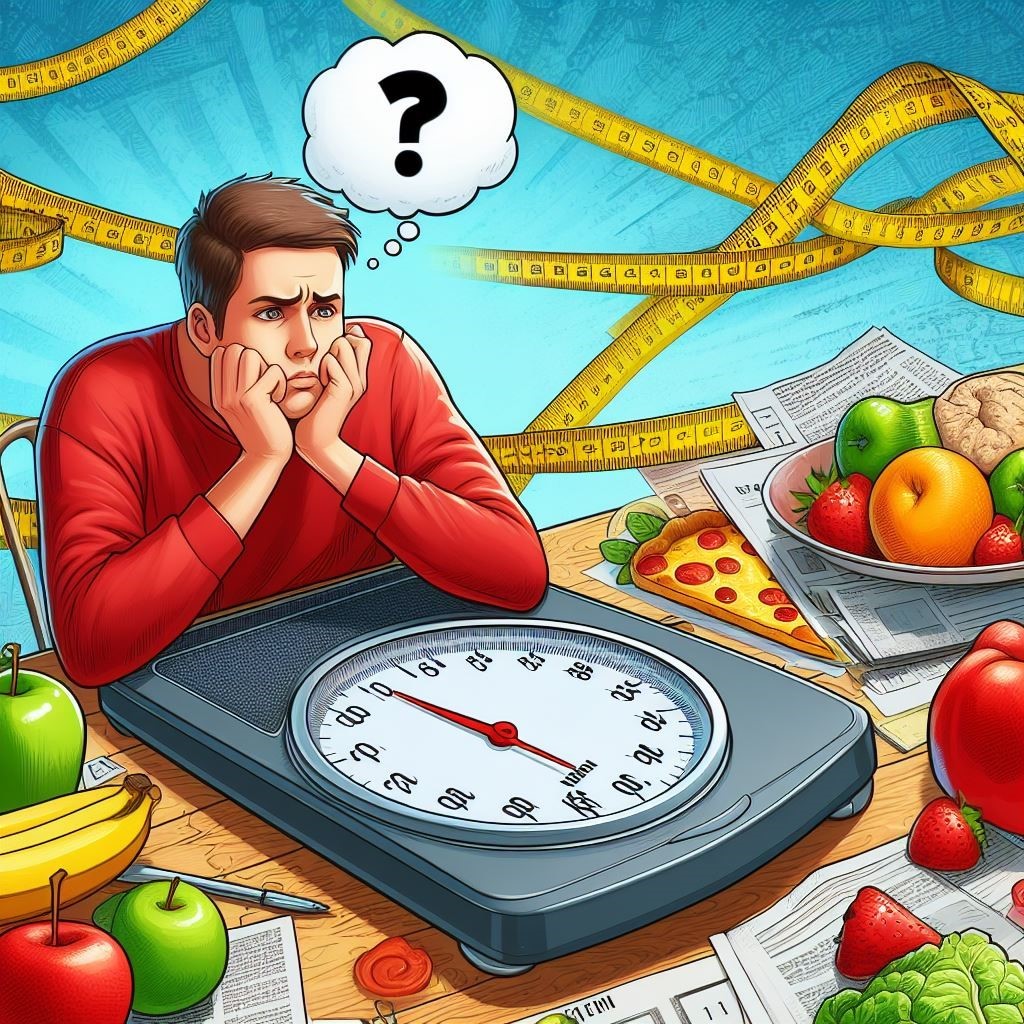Why Am I Not Losing Weight in a Calorie Deficit? Expert Guide
Unlock the answers to ‘Why Am I Not Losing Weight in a Calorie Deficit?’ with our expert guide. Discover the solutions to reach your weight loss goals.
Discover the expert guide to understand the reasons behind your weight loss plateau in a calorie deficit. Get insights on “Why Am I Not Losing Weight in a Calorie Deficit” and gain valuable knowledge from our blog post.
Countless individuals struggle to shed those extra pounds even when they’re adhering to a seemingly perfect diet and exercise routine. Don’t fret! This comprehensive guide will explore the reasons and provide expert-backed solutions to help you on your weight loss journey.
Introduction to Why Am I Not Losing Weight in a Calorie Deficit

Losing weight can be a challenging endeavour, especially when it feels like you’re doing everything right. A calorie deficit of consuming fewer calories than your body needs is well known and is the key to weight loss. But what happens when the scale refuses to budge, even when you’re following this golden rule? This tutorial will explore why you may not lose weight in a calorie deficit and provide practical solutions.
The Science of Calorie Deficit and Weight Loss
To better understand why you may not be losing weight in a calorie deficit, it’s crucial to grasp the science behind weight loss. The equation is relatively simple: when your body consumes fewer calories than it expends; it taps into energy reserves (stored fat) to make up the difference. As a result, you lose weight. However, as you’ll soon discover, several factors can complicate this seemingly straightforward formula.
What’s the daily calorie intake?
How many calories should you cut out to lose weight?
When you’re aiming to lose weight, a calorie deficit is key. But what is the ideal calorie deficit to facilitate weight loss?
The recommended calorie deficit for weight loss typically falls between 500 to 1000 calories per day. This range allows for a gradual, sustainable weight loss of around 1-2 pounds per week. Going beyond this deficit range can lead to muscle loss, nutritional deficiencies, and a slower metabolism, making it harder to maintain long-term weight loss.
It’s important to balance calorie deficit with nutrient intake. Weight loss is about nutrition and health, not just numbers on the scale.
How does a calorie deficit work?
Understanding how a calorie deficit works is fundamental to comprehending the science behind weight loss. So, how does it all come together? A calorie deficit generates an energy imbalance. Your body uses stored fat to make up for the energy deficit, causing weight loss. To put it simply, a calorie deficit forces your body to become more efficient in utilizing stored fat as a source of energy. This reduces weight and body fat over time. Weight loss isn’t only about calories in and calories out. Sustainable weight loss requires macronutrient distribution, dietary quality, exercise, sleep, and lifestyle.
How long does it take for a calorie shortage to show results?
Starting a weight loss journey takes time and patience. How quickly you see results in a calorie deficit depends on factors like your starting weight, metabolism, and activity level. Aim for a safe 1-2 pounds of weight loss per week for lasting results. Remember, it’s a marathon, not a sprint. Celebrate non-scale victories like improved mood and energy levels—they’re just as important. If you’re wondering, “Why am I not losing weight in a calorie deficit?” individual factors play a role, so stay consistent and focus on overall well-being.
Reasons Why You May Not Be Losing Weight in a Calorie Deficit

Losing weight can be a challenging journey, and it can be incredibly frustrating when your efforts don’t seem to yield the desired results. Don’t lose hope if you’ve been diligently shedding those extra pounds but haven’t seen the scale budge. There could be several reasons your weight loss efforts aren’t working as expected.
Here are some prevailing factors that could be impeding your weight loss progress while maintaining a calorie deficit:
1. Overestimating Calorie Intake.
It’s easy to overestimate the number of calories you’re consuming. Portion sizes can be deceptive, and even healthy foods can be calorie-dense. To avoid this pitfall, be diligent about measuring and weighing your food, and consider using a food diary or app to track your intake accurately.
2. Underestimating Calorie Expenditure.
Similarly, to underestimate the number of calories you burn through exercise and daily activities. Many factors, such as body composition, age, and fitness level, can influence your calorie expenditure. Consider using a heart rate monitor or fitness tracker to get a more accurate estimate.
3. Water Retention.
Water retention can mask weight loss and make it seem like you’re not progressing. Hormonal fluctuations, high sodium intake, and dehydration can all contribute to water retention. Drinking plenty of water, reducing sodium intake, and staying consistent with your diet and exercise routine can help alleviate this issue.
4. Inaccurate Tracking.
Misreporting or under-reporting food intake is a common issue that can hinder weight loss. Ensure you accurately track your meals, snacks, and beverages, including cooking oils, dressings, or sauces.
5. Metabolic Adaptation.
As you lose weight, your body’s metabolism may slow to conserve energy. This process, known as metabolic adaptation, can make it more challenging to lose weight in a calorie deficit. To counteract this, consider gradually decreasing your calorie intake or increasing your activity level.
6. Hormonal Imbalances.
With hormonal imbalances like thyroid problems or insulin resistance, weight loss can be harder. If you suspect that a hormonal imbalance may be affecting your weight loss efforts, consult with a healthcare professional for further evaluation and guidance.
7. Lack of Sleep.
Insufficient sleep can wreak havoc on your weight loss efforts by negatively affecting your metabolism and appetite regulation. Aim for 7-9 hours of quality sleep per night to support your weight loss goals.
8. Stress.
Chronic stress can hinder weight loss by increasing cortisol levels, which can lead to increased appetite, cravings, and fat storage. Implement stress-reduction techniques, such as meditation, deep breathing exercises, and regular physical activity, to help manage stress and support your weight loss efforts.
9. Muscle Gain
Gaining muscle can offset the fat loss, leading to a seemingly stalled weight loss progress. While the scale might not reflect it, you’re still changing your body composition positively. Consider tracking your progress with body measurements or body fat percentage assessments instead of solely relying on the scale.
10. Medical Conditions.
Weight loss can be impeded by medical problems such as hypothyroidism, PCOS, and hormonal abnormalities. If you suspect an underlying condition is hindering your progress, consult a healthcare professional who can provide proper diagnosis and guidance. Addressing the underlying condition may be crucial for successful weight loss.
11. Medications
Some medications, such as antidepressants, antipsychotics, or corticosteroids, can contribute to weight gain or hinder weight loss efforts. If you’re taking any medications and suspect they might be affecting your progress, discuss your concerns with your healthcare provider. They may adjust your medication or suggest alternative strategies to support your weight loss goals.
What to Do When You’re Not Losing Weight
If you’ve identified one or more of the reasons above as potential culprits for your stalled weight loss, consider implementing the following solutions:
- Reassess your calorie intake and expenditure: Ensure you’re accurately estimating your calorie needs and tracking your intake and expenditure. Adjust your calorie goals as needed to ensure you’re maintaining a deficit.
- Improve your tracking accuracy: Double-check portion sizes, weigh and measure your food, and use a food diary or app to track everything you consume.
- Stay consistent: Weight loss is rarely linear, and it’s essential to remain patient and consistent with your diet and exercise routine.
- Reevaluate your progress: Instead of relying solely on the scale, track your progress using body measurements, body fat percentage assessments, or how your clothes fit.
- Seek professional guidance: Should you find yourself facing persistent challenges in your weight loss journey, it is advisable to seek personalized advice and support from a healthcare professional or registered dietitian who can guide you through tailored strategies based on your specific needs.
Frequently Asked Questions about Why Am I Not Losing Weight in a Calorie Deficit
Q: Can I lose weight without counting calories?
A: Yes, some individuals succeed with weight loss without counting calories by focusing on portion control, making healthier food choices, and implementing regular exercise. However, tracking calories can provide a more accurate and objective approach to managing your weight loss efforts.
Q: How do I know if I’m in a calorie deficit?
A: Estimate your TDEE and measure your calorie intake to discover if you’re in a calorie deficit. You’re in a calorie deficit if you consistently consume fewer calories than your TDEE. Remember that weight loss progress can fluctuate, so monitoring your progress and adjusting as needed is essential.
Conclusion about Why Am I Not Losing Weight in a Calorie Deficit
Understanding the reasons behind stalled weight loss in a calorie deficit is crucial to overcoming plateaus and achieving your weight loss goals. By addressing the factors outlined in this guide, you’ll be better equipped to troubleshoot any obstacles you encounter on your journey. Stay consistent, be patient, and remember that weight loss is a marathon, not a sprint.
Reference
https://healthinsider.news/why-am-i-not-losing-weight-in-a-calorie-deficit-fasting-diet-en/



